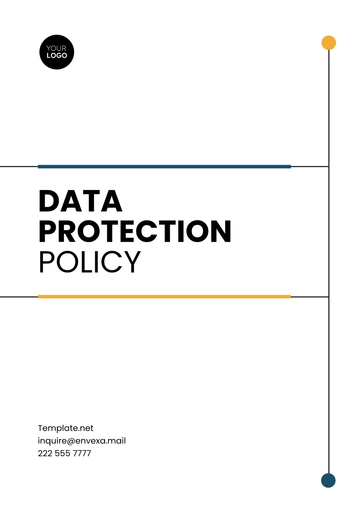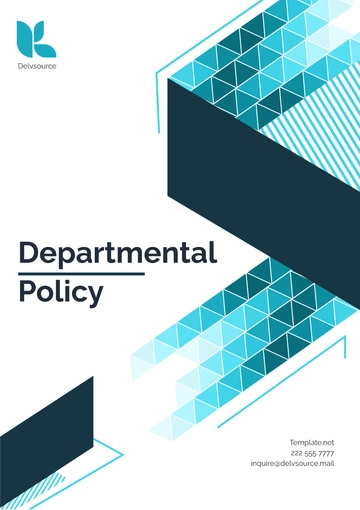Free Global Warming Climate Change Policy

OVERVIEW:
The Global Warming Climate Change Policy aims to address the urgent issue of climate change by harnessing the power of nature. By focusing on nature-based solutions, this policy seeks to mitigate the impacts of global warming, enhance climate resilience, and promote sustainable development.
PURPOSE:
The purpose of this policy is to:
Reduce greenhouse gas emissions through the conservation, restoration, and sustainable management of natural ecosystems.
Enhance the resilience of communities and ecosystems to the effects of climate change by integrating nature-based solutions.
Promote sustainable development practices that protect biodiversity and ecosystem services.
Foster public awareness and engagement in nature-based climate action.
SCOPE:
This policy applies to all governmental departments, agencies, and relevant stakeholders, including private sector entities, non-governmental organizations, and local communities. It encompasses sectors such as forestry, agriculture, urban planning, water management, and biodiversity conservation.
RESPONSIBILITY:
Government Agencies: Implement and enforce the policy, develop regulations, and provide funding for nature-based projects.
Private Sector: Adopt sustainable practices and invest in nature-based solutions within their operations.
Non-Governmental Organizations: Advocate for and participate in the implementation of nature-based climate initiatives.
Local Communities: Engage in and support local nature-based projects and sustainable practices.
Educational and Research Institutions: Conduct research and provide evidence-based recommendations to support policy implementation.
POLICY AND PROCEDURE:
Ecosystem Conservation and Restoration:
Action: Protect existing natural ecosystems and restore degraded ones, such as forests, wetlands, and grasslands.
Procedure: Develop and implement conservation programs, establish protected areas, and support reforestation and afforestation initiatives.
Sustainable Land Use Practices:
Action: Promote sustainable agriculture, forestry, and land management practices.
Procedure: Provide incentives for sustainable farming practices, support agroforestry, and implement sustainable forest management plans.
Green Infrastructure Development:
Action: Integrate green infrastructure into urban planning and development.
Procedure: Invest in the creation of urban green spaces, green roofs, and natural water management systems to reduce urban heat islands and improve air quality.
Nature-Based Adaptation Strategies:
Action: Utilize nature-based solutions to enhance climate resilience.
Procedure: Implement coastal mangrove restoration projects, restore wetlands for flood control, and protect watersheds to ensure water security.
Public Awareness and Education:
Action: Raise awareness about the importance of nature-based solutions in combating climate change.
Procedure: Develop and disseminate educational materials, conduct workshops and seminars, and engage in community outreach programs.
International Cooperation:
Action: Collaborate with other nations and international organizations to promote global nature-based climate action.
Procedure: Participate in international climate agreements, share knowledge and technology, and support global initiatives that focus on nature-based solutions.
Monitoring and Evaluation:
Action: Monitor and evaluate the effectiveness of nature-based solutions in mitigating climate change.
Procedure: Establish a robust monitoring system, conduct regular assessments, and publish reports on the progress and impact of nature-based initiatives.
This policy will be reviewed and updated periodically to incorporate new scientific findings, technological advancements, and evolving best practices in nature-based climate action. The responsible government agencies will lead this review process and ensure continuous improvement in the implementation of the policy.
- 100% Customizable, free editor
- Access 1 Million+ Templates, photo’s & graphics
- Download or share as a template
- Click and replace photos, graphics, text, backgrounds
- Resize, crop, AI write & more
- Access advanced editor
Shape effective strategies with Template.net's Global Warming Climate Change Policy template. This editable and customizable resource offers a structured framework for developing and analyzing policies addressing climate change. Seamlessly tailor and refine your document using our Ai Editor Tool, ensuring clarity and comprehensive coverage. Advocate for impactful environmental solutions, exclusively on Template.net.
You may also like
- HR Policy
- Restaurant Policy
- Company Policy
- Accounting Policies and Procedures
- Website Policy
- Privacy Policy
- Safety Policy
- School Policy
- IT and Software Policy
- Law Firm Policy
- Construction Policy
- Interior Design Policy
- Travel Agency Policy
- Education Academic Policy
- Security Policy
- Real Estate Policy
- Expense Policy
- Software Policy





























